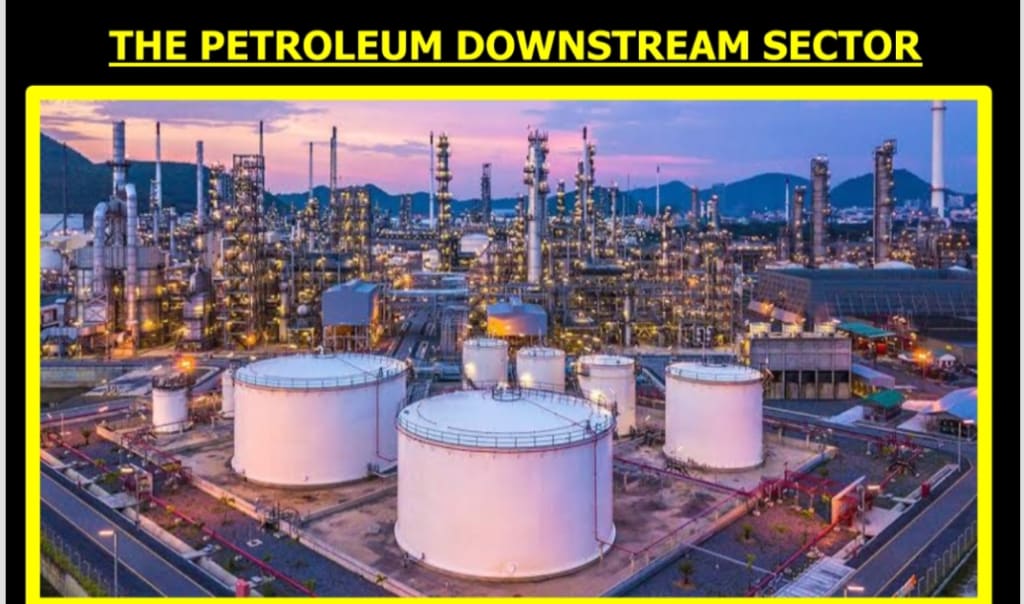Deregulation of the Petroleum Downstream Sector in Nigeria
The Petroleum Downstream Sector in Nigeria

DEREGULATION OF THE PETROLEUM SECTOR IN NIGERIA
INTRODUCTION
1. Industrialization and trade have being considered to be the basis of growth and development of every nation. Historically, the idea of privatization, commercialization and deregulation of public owned enterprises were first put to practice during the time of the Han Dynasty in China. In this era, the Mining Dynasty of China handover manufacturing industries to private individuals in the society to managed. Deregulation policy has globally been embraced by several countries in order to lessen public sector dominance for developing a liberalized market while ensuring adequate supply of products. This is applicable to Peru, Argentina, Pakistan, Philippines, Thailand, Mexico, Canada, Venezuela and United State of America and South Africa. All of which have systematically dismantled their state owned oil companies through deregulation. The Subsidy of petroleum products in Nigeria had its origin when the Federal Government in the late 1980 took the decision to reduce the effects of the structural adjustment programme. This initiated the deregulation of monetary system thereby decreasing the buying power some ordinary Nigerians.
2. Deregulation is the removal of regulations or restrictions, especially in a particular industry. The goals are to allow industries to operate businesses more freely, make decisions efficiently and remove corporate restrictions. The petroleum sector, also known as the oil industry is an industry that refines crude petroleum and processes natural gas into a multitude of products. It is also involved in the distribution and marketing of petroleum products.
3. The concern for the deregulation of the petroleum sector of the Nigerian economy has been on for long. Successive efforts have been made by various administrations by reducing the pump price of petrol at many petrol stations in the country. However, these efforts were unable to deliver a fully deregulated downstream market that should be based on the basic economic principle of demand and supply. It is against this backdrop that this presentation seeks to address the motives behind the deregulation of the petroleum sector in Nigeria.
4. The purpose of this paper is to highlight the importance of deregulating the petroleum sector. The paper will examine; Benefits of the Petroleum Sector Deregulation and the Challenges faced by the Petroleum Sector. This paper will be limited to the South-South region of Nigeria from 2017-2020. This was the period that the petroleum sector was faced with some difficulties in the areas of structures, institutions, petroleum industry bill and bridging of petroleum products to other part of the country. It is assumed that the impact of petroleum product unavailability from refineries to the South-South region is also applicable to other regions in Nigeria.
AIM
5. The aim of this presentation is to highlight the impact of deregulation on the petroleum sector with a view to making recommendations.
BENEFITS OF THE PETROLEUM SECTOR DEREGULATION
6. The benefits of deregulation of the petroleum sector are actually the reverse of the cost of regulation and subsidization. Some benefits of the petroleum sector deregulation include; efficiency in downstream sector, increase in revenue to the Government, abundant fuel supply and private sector participation. Others include; maintenance of refining and distribution assets and reduced rate of smuggling petroleum products.
7. Efficiency in the Downstream Sector. Efficiency in downstream sector will increase as a result of deregulation. This will lead to competition among marketers. The monopoly in product supply will be broken and the survival of the corporation will be guaranteed under a deregulated regime. This is because it will not continue to subsidize products prices. It is therefore necessary for the petroleum sector to through the downstream reform to refocus the petroleum industry to be able to fulfill the objectives for which it was set up.
8. Increase in Revenue to Federal Government. Revenue will be increased from deregulation of the petroleum sector. The Federal government at present sells 445,000 barrels of crude oil to The Nigerian National Petroleum Corporation (NNPC) for refining at international price. This has increased the revenue going to Federal Government. This amount could be used for economic development and poverty alleviation programmes of the Government. It is therefore imperative for the Federal Government of Nigeria to ensure that the income generated from the deregulation reform is properly used.
9. Abundant Fuel Supply. Abundant fuel supply would be brought about by the deregulation of the petroleum sector. Deregulation of the market implies that a regime of trade liberalization will be in place whereby petroleum products can be imported or exported. This will ensure abundant petroleum products in the economy and eliminate long queues at fuel stations. Therefore it is necessary for the petroleum industry to address the issue of bridging petroleum products in some region like that of the South-South region. This will increase the supply of fuel to every part of the country.
10. Private Sector Participation. Private sectors are given the chance to participate in the refining of petroleum products. Deregulation is very critical to private sector participation in refining because it ensures commercial viability of products supplies thereby enhancing profitability which is the major business attraction. The number of marketers and retail stations are likely to increase, with their positive impacts on business expansion as well as employment generation. Instead of dissociating from the industry, marketers are most likely to invest more. It is therefore imperative to give private investors the opportunity to participate in the refining of petroleum products.
11. Maintenance of Refining and Distribution Assets. Refining and distribution assets could be well maintained in the hands of private individuals than that of the public sector. One of the major problems in the past was lack of funds for the rehabilitation, maintenance of the refineries and the distribution facilities. This was as a result of the poor margins received by NNPC on the products manufactured. In a deregulated market, appropriate prices will be charged for products. Part of the proceeds will be used for plant rehabilitation and maintenance which will ensure that capacity utilization is increased and products made available at all times. Effective management of resources can put appropriate wage levels in place such that employees are paid realistic living wages and salaries. The welfare of the masses can equally be improved through provision of mass transit means of mobility and improved facilities. Therefore, it is pertinent for the petroleum sector to provide adequate funds for the rehabilitation, maintenance of the refineries and the distribution assets equally. This will boost the Nigerian economy.
12. Reduced Rate of Smuggling Petroleum Products. The rate of smuggling petroleum products will be reduced in the deregulation of petroleum products. The wide disparity in petroleum products prices between Nigeria and the neighbouring countries was responsible for the high rate of smuggling of petroleum products. A deregulated petroleum products market will ensure that the price gap is closed and smuggling becomes unattractive. It is therefore important for the petroleum sector to address the wide disparity in petroleum products prices between Nigeria and the neighbouring countries. This would reduce the rate of smuggling petroleum products.
CHALLENGES FACED IN THE PETROLEUM SECTOR
13. The Nigerian oil and Gas Industry is faced with many impending problems. Some of these problems includes; inadequate funding, environmental pollution caused by oil spillage and gas faring, oil theft and pipeline vandalization. It is therefore necessary to address these issues facing the petroleum sector.
14. Inadequate Funding. Inadequate funding has being a recurring problem in the Nigerian petroleum sector. The Federal Government, through the NNPC is facing funding challenges which is inhibiting the sector’s growth. The petroleum sector activities have been greatly hampered and almost being grounded completely by the challenges of funding by the Nigerian. It is therefore pertinent for the Petroleum sector to be adequately funded in order to maintain the activities of the sector.
15. Environmental Pollution Caused by Oil Spillage and Gas Flaring. Environmental pollutant refers to those substances and activities, both human and natural, which causes pollution and degradation of the various component of the environment. These components include; atmosphere, soil, biological diversity, fresh water, and physical environment. Oil spill is accidental or intentional release of liquid petroleum hydrocarbon into the air, land, sea due to human activity mainly. Oil spills are common occurrences in Nigeria, they occur due to a number of causes including-corrosion of pipeline and tanker. It has a major impact on the ecosystem. Oil spills in populated areas often spread over a wide range, destroying crops and aquacultures through contamination of the ground water and soils. The consumption of dissolved oxygen by bacteria feeding on the hydrocarbons also contributes to death of fish. The largest contributor of oil spills is the rupturing or leakage of production infrastructures that are old and lack regular inspection and maintenance. Therefore, the provision and legal statutory obligation to prevent environmental pollution and punishment for contravention of the provisions is necessary.
16. Oil Theft and Pipeline Vandalization. Oil theft and pipeline vandalization can be seen to be one of the major oil and gas problems in Nigeria s it reduces the revenue needed for the country, and affects the image of the country internationally. Nigeria can be seen as a country that depends solely on petroleum as a means of economics development. Oil can also be seen to be the basis of economic life and the act of oil theft and pipeline vandalisation can be seen to be a major threat to the survival of Nigeria as a country. Therefore, it is important for the law enforcement agencies to arrest and prosecute defaulters.
CONCLUSION
17. The benefits of deregulation of the petroleum sector include; efficiency in downstream sector, increase in revenue to the Government, abundant fuel supply and private sector participation. Others include; maintenance of refining and distribution assets and reduced rate of smuggling petroleum products. The petroleum sector, through the downstream reform should refocus the petroleum industry to be able to fulfill the objectives for which it was set up. The Federal Government of Nigeria should ensure that the income generated from the deregulation reform is properly used. The petroleum industry should address the issue of bridging petroleum products in some region like that of the South-South region. This will increase the supply of fuel to every part of the country. (Paragraphs 6-9)
18. Private investors should be given the opportunity to participate in the refining of petroleum products. It is pertinent for the petroleum sector to provide adequate funds for the rehabilitation, maintenance of the refineries and the distribution assets equally. This will boost the Nigerian economy. The petroleum sector should also address the wide disparity in petroleum products prices between Nigeria and the neighbouring countries. This would reduce the rate of smuggling petroleum products. (Paragraphs 10-12)
19. Issues facing the petroleum sector should be addressed. It is pertinent for the Petroleum sector to be adequately fund in order to maintain the activities of the sector. (Paragraphs 13 and 14)
20. The provision and legal statutory obligation to prevent environmental pollution and punishment for contravention of the provisions is necessary. It is important for the law enforcement agencies to arrest and prosecute defaulters. (Paragraphs 15 and 16)
RECOMMENDATIONS
21. It is recommended that the petroleum sector should:
a. Address the issue of bridging petroleum products in the South-South region. (Paragraph 17)
b. Address the wide disparity in petroleum products prices between Nigeria and the neighbouring countries. (Paragraph 18)
c. Provide adequate funds to maintain the activities of the sector. (Paragraph 19)





Comments
There are no comments for this story
Be the first to respond and start the conversation.